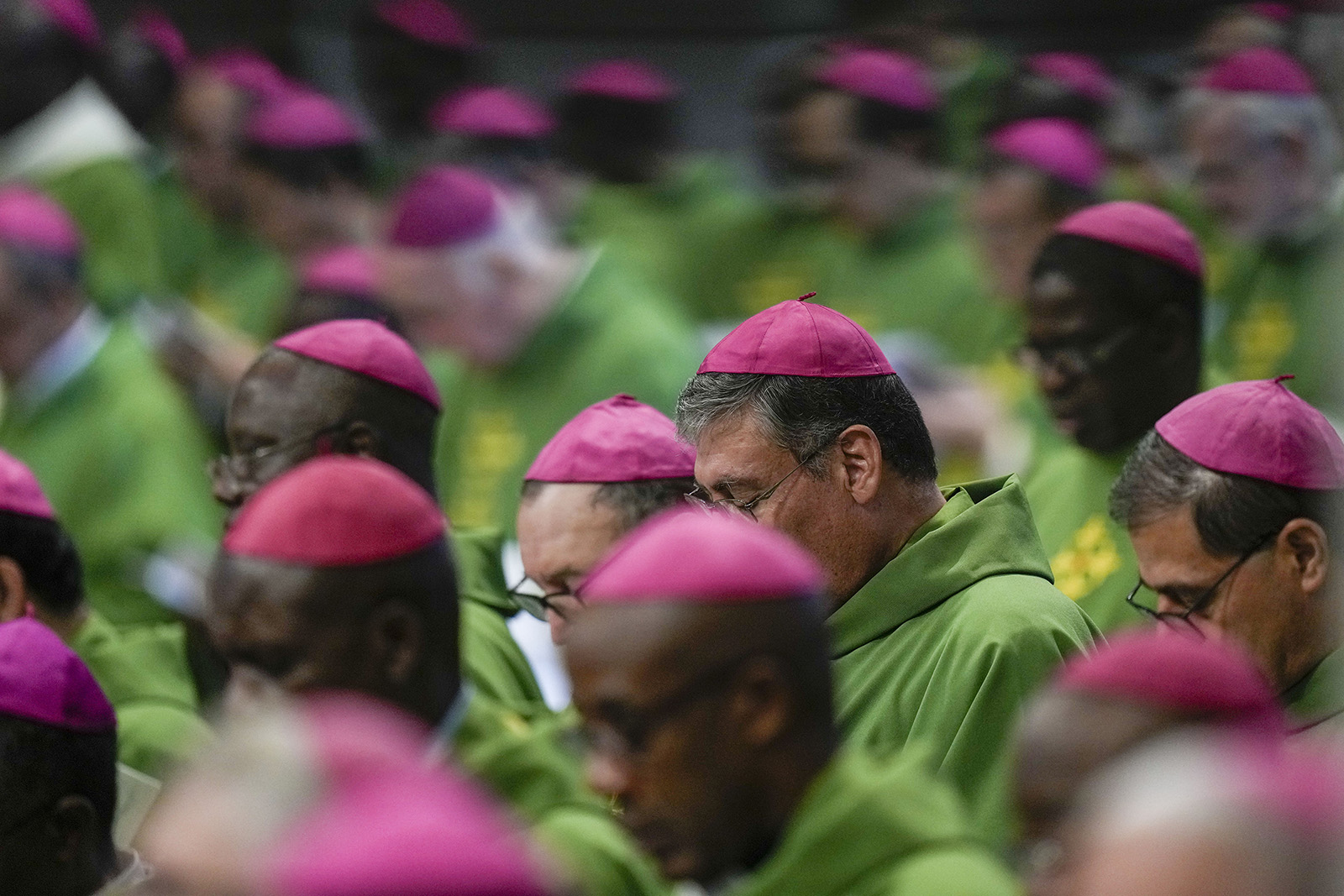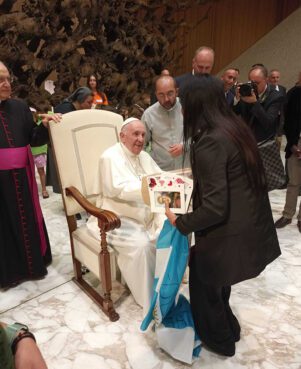VATICAN CITY (RNS) — He’s been called liberal, progressive, populist, disruptive and even pop, but Pope Francis remains as slippery as ever to those who want to confine the pontiff to a particular camp. The latest example of this ambiguity is Francis’ recent homophobic comments in which he suggested, using slurs, that he would bar gay men from becoming priests.
“Look, there is already an air of faggotry around, and it’s not good. There is a culture of homosexuality today that makes it so that those who have a homosexual orientation should not be welcomed (in seminaries),” said Francis, answering a question from a bishop during the Italian bishops’ annual gathering on May 20.
“It’s very difficult for a young man with this tendency to not go astray, because they come in thinking that the life of the priest can support them, but they eventually fall (into temptation) while administering the faith,” the 87-year-old pope said, according to Italian media reports.
Some supporters said Francis’ comments, made in a closed-door 90-minute session with the Italian bishops, might be excused as the papal equivalent of “locker-room talk”; papal supporters were also quick to underline that Italian is not the pope’s native language and that the words were taken out of context.
But Massimo Borghesi, a moral theologian and author of “The Mind of Pope Francis: Jorge Mario Bergoglio’s Intellectual Journey,” believes that some of the confusion over the pope’s stance on LGBTQ acceptance is in the minds of Catholics too anxious to see change in the church.
“A distinction that is probably unclear for many emerged, even if in an inappropriate way,” Borghesi told Religion News Service on Thursday (May 30). “While the pope states that the church should be inclusive and open to all, without any discrimination, many misunderstood this to mean that the pope wanted to blow apart all the institutions, beliefs and structures of the church and enact a radical reform.”

Bishops attend a Mass celebrated by Pope Francis for the closing of the 16th General Assembly of the Synod of Bishops, in St. Peter’s Basilica at the Vatican, Oct. 29, 2023. (AP Photo/Alessandra Tarantino)
The pope, in Borghesi’s view, was warning bishops that if gay men are only seeking refuge from discrimination in the all-male environment of the seminary, they are not acting on the right motivations for joining the priesthood.
Regardless of his precise intentions, the pope’s language struck many as a sharp contradiction from the pope who, asked about the question of ordaining gay men in 2013, answered “Who am I to judge?”
“Over the last couple of days, I have heard from many people, LGBTQ+ and straight, who have expressed frustration, bewilderment, anger, pain, and confusion over the comment,” said Marianne Duddy-Burke, the executive director of Dignity USA, a LGBTQIA+ Catholic advocacy group based in Boston, in an email.
“From the responses I’ve heard, people seem baffled by how inconsistent this behavior is with Pope Francis,” she added.

The Rev. Andrea Conocchia, center, introduces members of the Torvaianica transgender community to Pope Francis on Aug. 11, 2022, during the pope’s general audience at the Vatican. (Photo courtesy of Andrea Conocchia)
Francis has regularly, if not entirely consistently, created an unprecedented opening toward LGBTQ Catholics. He regularly meets and corresponds with LGBTQ advocacy groups, reportedly told gay and trans individuals he has invited to the Vatican that “God loves you just the way you are” and frequently calls for the welcoming and inclusion of gay believers in the church.
“In the church there is place for everyone, for everyone! No one is useless, no one is superfluous, there is space for everyone. Just the way we are, everyone,” the pope said in an apology for his comments to the Italian bishops, issued by the Vatican communications office May 28.
Under Francis, the Vatican has opened its doors to trans prostitutes living in the outskirts of Rome, offering them free medical screening and COVID-19 vaccines. The Holy See has increasingly opposed LGBTQ discrimination laws passed by nations in Africa and elsewhere, condemning any form of violence against LGBTQ individuals.
But while the pope’s gestures have been groundbreaking, he has done little to change the church’s doctrinal position that homosexual acts are sin and homosexuality is “intrinsically disordered.” His most recent comments went counter to recent efforts by Italy’s bishops to allow openly gay men to be ordained if they commit to a life of chastity.
A prominent officer at the Vatican’s doctrinal department, Archbishop Charles Scicluna, seemed more concerned with heterosexual priests whose relationships with women have yielded children. In an interview in January, he called priests’ paternity “a global reality,” suggesting the church would be wise to “revise the requirement that priests have to be celibate.”
While the Vatican Department for the Doctrine of the Faith this spring ruled that priests could bless individuals in same-sex relationships, the pope, in his interview with CBS that aired May 20, said blessing gay relationships is “against natural law.”

Pope Francis being interviewed by CBS’ Norah O’Donnell on “60 Minutes.” (Photo by Adam Verdugo/CBS News/60 Minutes)
“That cannot be done because that is not the sacrament. I cannot. The Lord made it that way,” Francis told “60 minutes.”
“But to bless each person, why not?” the pope added.
LGBTQ activists seem to have lost patience with a pope they have long praised. Organizers of the Gay Pride parade in Rome, scheduled for June 15, warned the pope on social media recently, “just you wait.”
“I do think that he is in some ways the embodiment of the church’s dilemma on LGBTQ+ people,” wrote Duddy-Burke. “On the one hand, we want to welcome, affirm, and serve all people. On the other, many in the church, especially among its leaders, are trying to uphold official teachings that say our gender identities or sexual orientations are inconsistent with God’s intent for humanity.
“These are irreconcilable, and trying to make two incompatible things true at the same time leads to this kind of confusion,” she said.
“It is also deeply traumatizing to people, who feel hopeful when it seems like the church is making progress and then get crushed by statements or events that remind us we are seen as objectively disordered,” she added.
The pope has also seemed to waffle on women’s roles in the church. He has stated that “the church is female” and commissioned no fewer than three panels to study aspects of women becoming deacons, who may preach the homily at Mass and perform some sacraments. But on “60 Minutes” he answered with a definitive “no” the question of whether he favors female deacons.
But the outlook on LGBTQ issues especially has seesawed between the pope’s own openness to trans individuals personally and official Vatican policy. A recent document condemned sex-change operations and gender theory as threats to human dignity.
On surrogacy, a topic closely watched by many Catholic women and LGBTQ individuals alike, the pope has consistently and strongly condemned it, calling the practice “despicable.” But in the “60 minutes” interview, even here the pope admitted that “in each case the situation should be carefully and clearly considered.”
RELATED: Carbon-dating of ancient tunics of Saints Peter and John separates legend from reality
Many Vatican observers are coming to the conclusion that the revolution Francis’ pastoral talk once promised has already taken place: He has opened the church up to forms of dialogue and dissent that would have been unthinkable before his election in 2013, most recently through the Synod on Synodality.
Born from a massive consultation of Catholics from all over the world and set to conclude next October, has brought to the fore the concerns, fears and challenges facing rank-and-file Catholics. The pope listened to what the faithful had to say, which in no small way focused on the questions of LGBTQ inclusion and female leadership in the church.
But he has made clear these items will not be discussed at the next synod meeting, instead pushing them to the 2025 agenda.
The aging pope has often said that the synod is about “starting processes” and opening the door; it’s not a decision-making body. Francis isn’t going to change church doctrine and he might not be the right pope for the job, given his recent remarks. Under Francis, everyone is invited to the table, but the rules stay the same.
RELATED: Pope Francis disappoints progressives. He will do so again.
Discover more from CaveNews Times
Subscribe to get the latest posts sent to your email.


























![Exploring the Serene Beauty of Nature: A Reflection on [YouTube video title]](https://cavemangardens.art/storage/2024/04/114803-exploring-the-serene-beauty-of-nature-a-reflection-on-youtube-video-title-360x180.jpg)


























